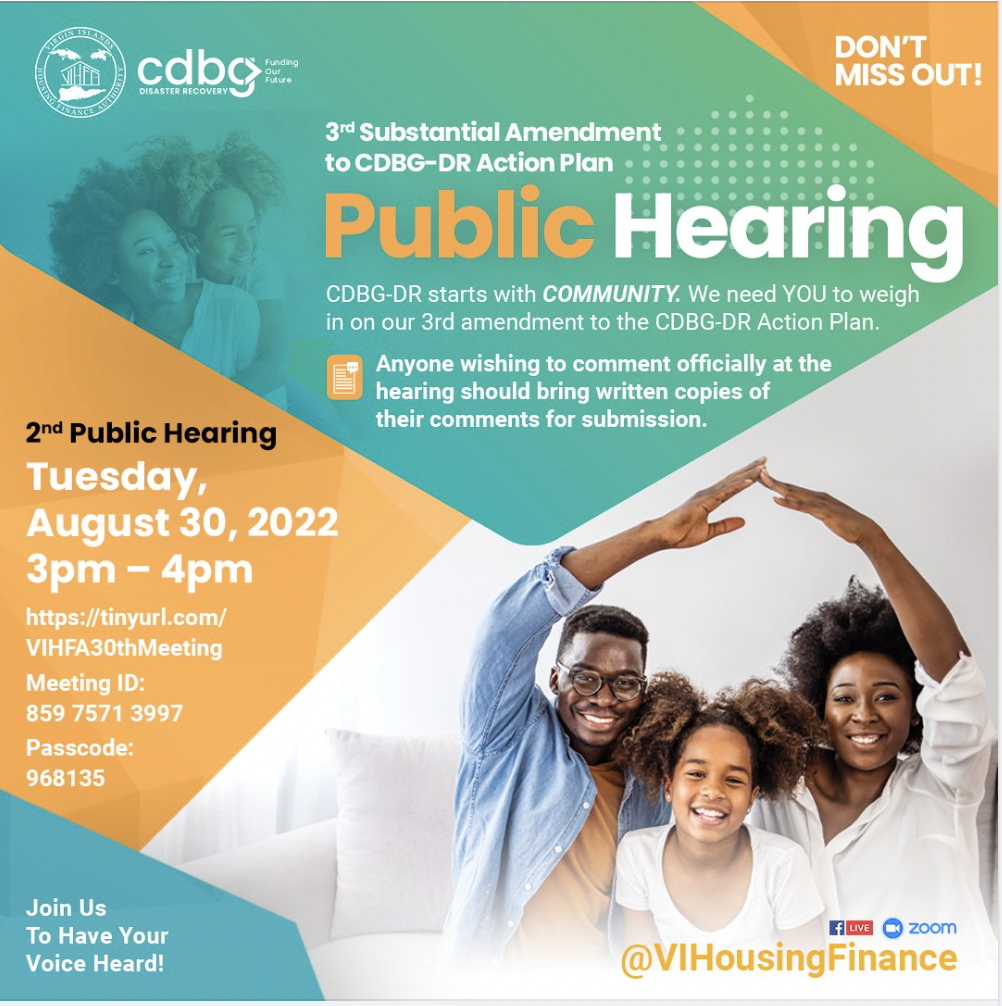The V.I. Housing Finance Authority wants the public to weigh in on the latest proposed changes to a $1.07 billion community block grant action plan given to the territory four years ago. Administrators working with the block grant program held two virtual public hearings at the end of August to present details of the action plan amendments.

Discussion of proposed changes under the Third Substantial Amendment to the Community Development Block Grant Action Plan took place during virtual public hearings held Aug. 23 and Tuesday afternoon.
“Pursuant to our Citizen Participation Plan, we have to have these hearings. These funds directly affect the public, so we need your input in anything greater than one percent changes that we have to the budget,” said Housing Finance Authority Communications Manager Keva Muller.
The funding was approved for the Virgin Islands as part of a disaster recovery plan after the passage of Hurricanes Irma and Maria in 2017. And unless an extension is granted by the Department of Housing and Urban Development, the territory has six years to spend all of its HUD-approved recovery funds.
There have already been two approved adjustments to the block grant spending plan, first enacted in 2018. Housing Finance officials say the third set of Action Plan Amendments is intended to cover unmet needs for recovery assistance in housing, infrastructure, and economic revitalization throughout the territory.
The new round of proposed changes also seeks to fund projects administrators believe they can complete within HUD’s deadline. Documents filed as part of the proposal predicted how — if approved — the changes would play out.
Housing recovery aid is expected to increase by 13 percent; much of the aid made available through the EnVision Tomorrow program. “There is a continuing need for repairs to storm-damaged housing and to increase our inventory of affordable single-family rental housing. In the Virgin Islands, there are increasing costs of construction due to labor and materials,” said Housing Finance’s Director of Programs for CDBG-DR Ann Hanley.
Aid for public services increased by $3.5 million under the previous amendment to the block grant plan. The funding in that sector is intended to support at-risk populations and to help local nonprofits increase their ability to secure federal funding.
Allocations to promote infrastructure recovery were trimmed by 5.8 percent. To spend the remaining funds on time, grant managers chose six projects: seven new Waste Management convenience centers, a slope stabilization project, assignment of street addresses, a St. Thomas port dredging project, partial closing of St. Croix’s Anguilla Landfill, and a generator project for WAPA’s Randolph Harley Power Plant.
Economic development recovery was reduced by 3.8 percent. That’s because the Port Authority’s port dredging project was reclassified as an infrastructure project, with VIFHA requesting a waiver from HUD to fund the project, though it has not yet been approved, administrators said in an executive summary appearing on the Housing Finance Authority website.
VIHFA also wants to shift funding in this category away from workforce development and tourism promotion and refocus on support of small businesses. They also want to direct block grant funds toward the revitalization of Virgin Islands commercial corridors.
A Notice of Funding Availability is expected to appear in June for block grant funds supporting the recovery of public facilities. Authors of the summary say this category of funding is intended to increase interim housing for the elderly and homeless, victims of domestic violence, and the disabled. Other facilities, not housing-related, may be eligible for public facilities funding at a later date, the summary authors say.
The public is invited to review details of the plan at the Housing Finance Authority website. Visitors to the link can also see recordings of the public hearings and view online comments and questions posed by other participants.
There is also a public comment period where those who have questions and comments can make them on the record for consideration by decision-makers. Comments can be sent by email to cdbgdr@vihfa.gov.


